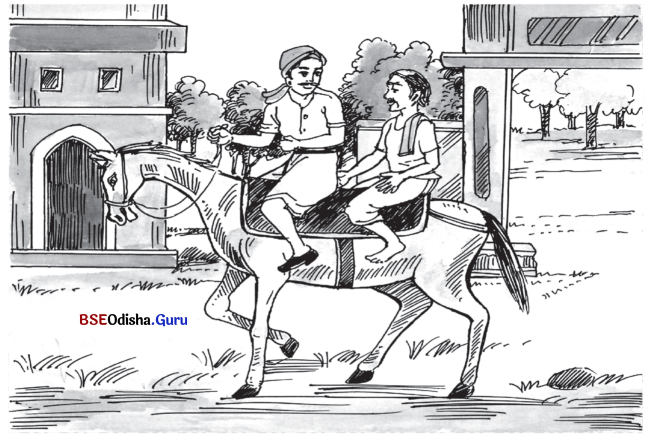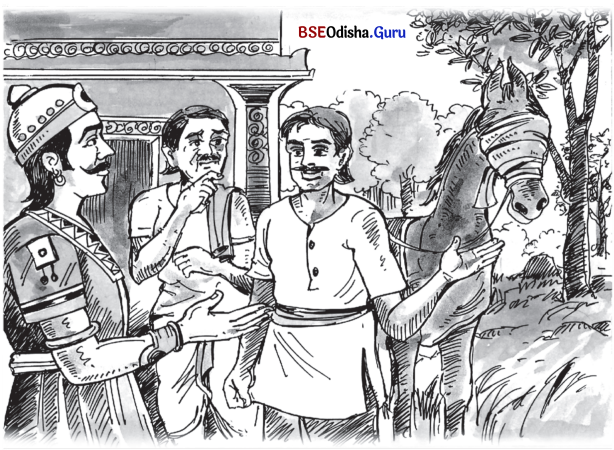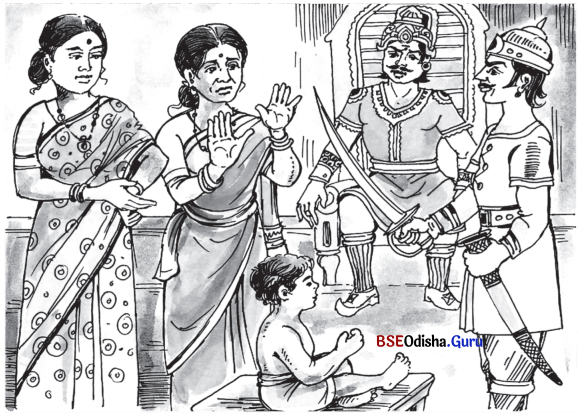Odisha State Board BSE Odisha 8th Class English Solutions Lesson 1 Whose Horse Was It Textbook Exercise Questions and Answers.
Class 8th English Chapter 1 Whose Horse Was It Question Answers BSE Odisha
Whose Horse Was It Class 8 Questions and Answers
Session – 1
Pre-Reading (ପ୍ରାକ୍-ପଠନ):
See the picture. (ଛବିଟିକୁ ଲକ୍ଷ୍ୟ କର)
1. What do you see?
(କ’ଣ ଦେଖୁଛ ?)
Answer:
I see picture of a city with two men on the horse.
2. Who are there?
(ସେଠାରେ କେଉଁମାନେ ଅଛନ୍ତି ? )
Answer:
There are two men on a horse.
![]()
3. What can be the place?
(ସ୍ଥାନଟି କ’ଣ ହୋଇପାରେ ?)
Answer:
The place may be a road in a city.
Look at the picture and the title of the lesson. Do you think the picture is about the title? Read the story to know.
(ଚିତ୍ର ଏବଂ ବିଷୟର ଶୀର୍ଷକକୁ ଲକ୍ଷ୍ୟ କର । ଚିତ୍ରଟି କ’ଣ ଶୀର୍ଷକ ସମ୍ପର୍କିତ ବୋଲି ତୁମେ ଭାବୁଛ ? ଅବଗତି ନିମନ୍ତେ ଗଳ୍ପଟିକୁ ପାଠ କର ।)

II. While Reading (ପଢ଼ିବା ସମୟରେ)
• The teacher will ask students to read the story part by part silently. After the students have read a part silently, s/he will ask the comprehension questions meant for the SGP. Only then can s/he can move to the next part. (ଶିକ୍ଷକ ଛାତ୍ରମାନଙ୍କୁ ଗପଟି ଅନୁଚ୍ଛେଦପରେ ଅନୁଚ୍ଛେଦ କ୍ରମରେ ନୀରବରେ ପଢ଼ିବାକୁ କହିବେ । ଛାତ୍ରଛାତ୍ରୀମାନେ ନୀରବର ପଢ଼ିସାରିବା ପରେ ସେ ତାହା ମଧ୍ୟରୁ କେତେକ ସଂକ୍ଷିପ୍ତ ପ୍ରଶ୍ନ ପଚାରିବେ ।)
Text
• SGP – 1
• Read paragraphs 1-2 silently and answer the questions that follow.
1. One day ………………………………. rode to the town.
ଦିନେ ଜଣେ ଯୁବକ ତାଙ୍କ ଘୋଡ଼ାରେ ସହରକୁ ଯାଉଥିଲେ । ସହର ପାଖାପାଖି ସ୍ଥାନରେ ସେ ଗୋଟିଏ ଭିକାରି ଦେଖିଲେ । ଭିକାରିଟି ଚିତ୍କାର କରି ସେ ଯୁବକଙ୍କୁ କହିଲା । ମହାଶୟ, ଦୟାକରି ଆପଣଙ୍କ ଘୋଡ଼ାରେ ମୋତେ ବଜାରକୁ ନେଇଯାଆନ୍ତୁ । ମୁଁ ଜଣେ ଛୋଟା ଲୋକ । ଦୟାଳୁ ଯୁବକ ରାଜି ହୋଇଗଲେ ଏବଂ ଭିକାରି ଜଣକୁ ତାଙ୍କ ଘୋଡ଼ା ଉପରେ ବସାଇଲେ ଏବଂ ସହରକୁ ଗଲେ ।
2. They reached …………………………………….. go to him”.
ସେମାନେ ବଜାରରେ ପହଞ୍ଚିଲେ । ଯୁବକ କହିଲେ, ‘ତୁମେ ଏବେ ଘୋଡ଼ାରୁ ଓହ୍ଲାଇପଡ଼ ।’’ ‘‘କିନ୍ତୁ ମୁଁ ଓହ୍ଲାଇବାକୁ ଚାହେଁ ନାହିଁ । ତୁମେ ମୋ ଘୋଡ଼ାରୁ ଓହ୍ଲାଇଯାଅ । ଭିକାରି ଜଣକ ଓଲଟା କହିଲା । ‘ତୁମ ଘୋଡ଼ା ? ଏଇଟି ମୋର ଘୋଡ଼ା । ‘ତୁମ ଘୋଡ଼ା ?”’ ‘ହଁ ମୋ ଘୋଡ଼ା । ଓହ୍ଲାଇପଡ଼ ନହେଲେ ମୁଁ ରାଜାଙ୍କ କର୍ମଚାରୀଙ୍କ ପାଖକୁ ତୁମକୁ ନେଇଯିବି । ଠିକ୍ ଅଛି, ଚାଲ ତାଙ୍କ ପାଖକୁ ।’’
![]()
Word Meaning
young man : ଯୁବକ
gate : entrance or passage way (ପ୍ରବେଶ ଦ୍ଵାର)
lame : unable to walk well (ଯିଏ ଠିକ୍ ଭାବେ ଚାଲି ପାରନ୍ତି ନାହିଁ / ଛୋଟା ଲୋକ / ଭିନ୍ନକ୍ଷମ )
agreed : united by being of the same opinion (ରାଜି ହେଲେ)
rode : sit and travel on the back of an animal (ଯାତ୍ରା କଲେ)
get off : to climb down (ସ୍ଥାନ ଚାଡ଼ିବା / ଓହ୍ଲାଇ ପଡ଼ିବା) (opposite of geton)
go on : continue (କୌଣସି କାର୍ଯ୍ୟ ଚାଲୁ ରଖୁବା)
kind : good-hearted I kind hearted / gracious (ଦୟାଳୁ)
Comprehension Questions and Answers : (ସଂକ୍ଷିପ୍ତ ପ୍ରଶ୍ନୋତ୍ତର)
Question 1.
Who was going to the town?
(କିଏ ସହରକୁ ଯାଉଥିଲା ?)
Answer:
A young man was going to the town.
Question 2.
Who did he see at the town gate?
(ସହରର ଫାଟକ ପାଖରେ ସେ କାହାକୁ ଦେଖିଲେ ?)
Answer:
He saw a beggar at the town gate.
Question 3.
What did the beggar ask for?
(ଭିକାରୀଟି କ’ଣ ମାଗିଲା ?)
Answer:
The beggar asked the young man for taking him to the town market.
Question 4.
What did the young man do? Why?
(ଯୁବକଟି କ’ଣ କଲା ? କାହିଁକି ?)
Answer:
The young man put the beggar on his horse because the beggar was a lame man.
![]()
Question 5.
What did he ask the beggar to do at the market?
(ସେ ଭିକାରୀଟିକୁ ବଜାରରେ କ’ଣ କରିବାକୁ କହିଲା ?)
Answer:
The young man asked the beggar to get off the horse at the market.
Question 6.
What did the beggar say?
(ଭିକାରୀଟି କ’ଣ କହିଲା ?)
Answer:
The beggar refused to get off.
Question 7.
Whom did they go to settle their quarrel?
(ସେମାନେ କାହା ପାଖକୁ କଳି ସମାଧାନ କରିବାକୁ ଗଲେ ?)
Answer:
They went to the king’s officer to settle their quarrel.
Session – 2
• Read paragraphs 3 and 4 silently and answer the questions that follow.
3. So, they ………………………………………………… my horse from him.
ତେଣୁ ସେମାନେ ରାଜାଙ୍କ କମର୍ଚାରୀଙ୍କ ନିକଟକୁ ଗଲେ । ଯୁବକଟି କହିଲା, ‘ମହଶୟ, ମୁଁ ମୋ ଘୋଡ଼ାରେ ଚଢି ସହରକୁ ଆସୁଥୁଲି । ଏ ଲୋକଟି ସହରର ହାଟକୁ ଆସିବାପାଇଁ ଇଚ୍ଛାକଲା । ସେ ଛୋଟା ଲୋକ । ଏଣୁ ମୁଁ ତାକୁ ଘୋଡ଼ାରେ ବସାଇ ବଜାରକୁ ଆଣିଲି । ସେ ବର୍ତ୍ତମାନ କହୁଛି ଏ ଘୋଡ଼ାଟି ତା’ର । ମହାଶୟ, ଦୟାକରି ମୋତେ ମୋ ଘୋଡ଼ାଟି ଫେରିପାଇବାରେ ସାହାଯ୍ୟ କରନ୍ତୁ ।
4. The beggar said …………………………….. not know.

ଭିକାରିଟି କହିଲା, ‘‘ଆଜ୍ଞା ସେ
ଯୁବକ ଗୋଟିଏ ଚୋର ଏବଂ ମିଛୁଆ ।
ଏଇଟି ମୋ ଘୋଡ଼ା । ମୁଁ
ଛୋଟାଲୋକ । ଭଲ ଭାବରେ
ଚାଲିପାରେନା । ଏଣୁ ଏ ଘୋଡ଼ାଟି ମୁଁ
କିଣିଛି । ରାଜାଙ୍କ କର୍ମଚାରୀ ଉଭୟଙ୍କୁ
ଭଲକରି ଅନାଇଲେ । କିଏ ଏମାନଙ୍କ
ମଧ୍ୟରୁ ଚୋର ? କାହାର ଏ ଘୋଡ଼ା ?
ସେ ଜାଣିପାରିଲେ ନାହିଁ ।
Word Meaning
riding : ride on a horse (ଘୋଡ଼ା ଚଢ଼ି ଆସୁଥୁଲି)
help : give assistance (ସାହାଯ୍ୟ କରିବା)
thief: one who steals (ଚୋର)
liar: one who tells lie (ମିଛୁଆ)
bought: got something by paying money (କିଣିଛି)
well: ଭଲ ଭାବରେ
looked at: ଚାହିଁଲା
![]()
Comprehension Questions and Answers : (ସଂକ୍ଷିପ୍ତ ପ୍ରଶ୍ନୋତ୍ତର)
Question 1.
Who listened to their complaint?
(କିଏ ତାଙ୍କର ଅଭିଯୋଗ ଶୁଣିଲେ ?)
Answer:
The king’s officer listened to their complaint.
Question 2.
What did the beggar say ?
(ଭିକାରୀଟି କଣ କହିଲା ?)
Answer:
The beggar said that he was a lame man. He could not walk well. So he bought that horse.
Question 3.
Could the officer decide their case?
(ଅଫିସରଜଣକ ସେମାନଙ୍କର ସମସ୍ୟା ବୁଝିପାରିଲେ କି ?)
Answer:
No, the officer could not decide their case.
Question 4.
The officer couldn’t decide their case. Why? Let’s see what will happen next.
(ଅଫିସରଜଣକ ସେମାନଙ୍କର ସମସ୍ୟା ନିଷ୍ପଭି କରିପାରିଲେ ନାହିଁ କାହିଁକି ? ଚାଲ ଦେଖିବା ତା’ପରେ କ’ଣ ଘଟିଲା ?)
Answer:
The officer could not decide their case because he could not know who was the right owner.
![]()
• SGP-3
• Read paragraphs 5 and 6 silently and answer the questions that follow.
5. “Sir ………………………………. left eye”.
ଯୁବକ ଜଣକ ରାଜକର୍ମଚାରୀଙ୍କୁ କହିଲେ, ‘‘ମହାଶୟ ମୁଁ ଗୋଟିଏ ପ୍ରଶ୍ନ ପଚାରିପାରେ କି ? ରାଜ କର୍ମଚାରୀ କହିଲେ, ‘ନିଶ୍ଚୟ, ପଚାର ।’’ ଯୁବକ ଜଣକ ତା’ମୁଣ୍ଡରୁ ଟୋପିଟି କାଢିନେଲା ଏବଂ ସାଙ୍ଗେ ସାଙ୍ଗେ ଘୋଡାର ଆଖୁରେ ଘୋଡ଼ାଇଦେଲା । ତା’ପରେ ସେ ଭିକାରିକୁ କହିଲା, ‘ତୁମେ କହୁଛ, ଏ ଘୋଡ଼ା ତୁମର । ତୁମ ଘୋଡ଼ାକୁ ତୁମେ ଭଲ ଭାବରେ ଜାଣିଛ ନିଶ୍ଚୟ । ବର୍ତ୍ତମାନ ମୋତେ କୁହ, ଘୋଡ଼ାର ଦୁଇ ଆଖ୍ ମଧ୍ୟରୁ କେଉଁଟି ଅକାମୀ ? ଡାହାଣ ଆଖୁ ନା ବାମ ଆଖ୍ ?’’ ଭିକାରିଟି ଥଙ୍ଗ ଥଙ୍ଗ ହୋଇ କହିଲା, ଡାହାଣ ଆଖୁ, ଯୁବକ ଜଣକ ଜୋରଦେଇ ପଚାରିଲେ, ‘ଡାହାଣ ଆଖ୍ ? ନିଶ୍ଚିତ ତ ?, ‘‘ଭିକାରିଟି ଥଙ୍ଗ ଥଙ୍ଗ ହୋଇ ପୁଣି କହିଲା,’’ ନା- ବାମ ଆଖ୍ !
6. The young man ………………………………….. prison.”
ଯୁବକ ଜଣକ ରାଜକର୍ମଚାରୀଙ୍କ ଆଡକୁ ଅନାଇ କହିଲା, ‘ମହାଶୟ ମୋର ଘୋଡ଼ାର ଆଖୁ ଦୁଇଟି ପୂରା ଠିକ୍ । ଆଦୌ କଣା କିମ୍ବା ଅନ୍ଧ ନୁହେଁ । ଦୟାକରି ତା’ର ଆଖୁଗୁଡ଼ିକୁ ଚାହାଁନ୍ତୁ ।
ରାଜକର୍ମଚାରୀ ଜଣକ ଘୋଡ଼ାମୁହଁରୁ ଟୋପିଟି କାଢ଼ିନେଲେ । ସେ ଘୋଡ଼ାର ଦୁଇ ଆଖୁକୁ ଚାହିଁଲେ । ଘୋଡ଼ାଟି ଆଦୌ ଅନ୍ଧ ନଥୁଲା ।
ସେ ଭିକାରିକୁ କହିଲେ ‘ତୁ ଗୋଟାଏ ଚୋର ।’’ ମୋ ସାଙ୍ଗରେ ଅ । ମୁଁ ତୋତେ ବନ୍ଦୀ ଘରେ ବନ୍ଦ କରିଦେବି ।’’
Word Meaning
took off : remove (ବାହାର କରିଦେବା / ଖୋଲିଦେବା)
sure : to be confident about something (ନିଶ୍ଚିତ ହେବା)
question: a sentence of inquiry that asks for a reply (ପ୍ରଶ୍ନ)
turbans: a traditional headdress consisting of a long scarf wrapped around the head (ପଗଡ଼ି)
quickly: speedily
covered : wrapped (ଘୋଡ଼ାଇ ପକାଇଲା)
blind: unable to see (ଅନ୍ଧ)
Comprehension Questions and Answers : (ସଂକ୍ଷିପ୍ତ ପ୍ରଶ୍ନୋତ୍ତର)
Question 1.
What did the young man do with his turban?
(ଲୋକଟି ତାହାର ପଗଡ଼ିକୁ କ’ଣ କଲା ?)
Answer:
The young man took off his turban and quickly covered the eyes of the horse.
Question 2.
What did he ask the beggar?
(ସେ ଭିକାରୀଟିକୁ କ’ଣ କହିଲା ?)
Answer:
He asked the beggar to tell which of the horse’s eyes was blind.
Question 3.
Could the beggar answer his question? Why?
(ଭିକାରୀଟି ତାଙ୍କ ପ୍ରଶ୍ନର ଉତ୍ତର ଦେଇପାରିଲା କି ? କାହିଁକି ?)
Answer:
The beggar couldn’t answer his question correctly because the horse has not belonged to him.
![]()
Question 4.
What did the young man say?
(ଯୁବକଟି କ’ଣ କହିଲା ?)
Answer:
The young man said that his horse’s eyes were alright.
Question 5.
What did the officer do to find the truth?
(ସତ୍ୟ ଜାଣିବା ପାଇଁ ଅଫିସରଜଣକ କ’ଣ କଲେ ?)
Answer:
The officer took him to get him in prison to find the truth.
Question 6.
What happened to the beggar?
(ଭିକାରୀଟିର କ’ଣ ହେଲା ?)
Answer:
The beggar was put in prison.
Session- 3
III. Post-Reading (ପଢ଼ିବା ପରେ )
1. Visual Memory Development Technique (VMDT)
Whole Text: The young man saw a beggar near the town gate.
Put the beggar on his horse.
I don’t want to get off.
Went to the king.
Part: Paragraphs 5 and 6-took off his turban, covered the horse’s head, not blind at all, I’ll put you in prison.
Comprehension Activities : (ବୁଦ୍ଧି ପରିମାପକ କାର୍ଯ୍ୟାବଳୀ)
MCQs :
Choose the correct alternatives and fill in the blanks.
Question 1.
The young man saw ___________ near the town gate.
(A) a priest
(B) a beggar
(C) a grocer
(D) a greengrocer
Answer:
(B) a beggar
Question 2.
The beggar told not to __________.
(A) get off the horse
(B) go to the king
(C) get down at the marketplace
(D) speak to the young man
Answer:
(A) get off the horse
![]()
Question 3.
The young man and the beggar met ___________.
(A) the king
(B) the minister
(C) the gate-keeper
(D) the king’s officer
Answer:
(D) the king’s officer
Question 4.
The horse was :
(A) blind in the right eye
(B) blind in the left eye
(C) blind in both the eyes
(D) not blind at all.
Answer:
(D) not blind at all.
Question 5.
__________ was very clever.
(A) The king’s officer
(B) The young man
(C) The beggar
(D) The king
Answer:
(B) The young man
Session- 4
3. Listening : (ଶ୍ରବଣ)
(a) Your teacher read out the following lines from paragraph 2.
Listen to him/her carefully and fill in the blanks with the words missing.
So, they went to the ______. The ______ said to the king’s officer, “Sir, I was ______ to the town on my horse. This man wanted to come to the __________. He is lame. So I brought him to the market on __________. Now he says that _______ is his. Sir, please help me ______ from him”.
Answer:
So, they went to the king’s officer. The young man said to the king’s officer, “Sir, I was riding to the town on my horse. This man wanted to come to the market. He is lame. So I brought him to the market on my horse. Now he says that the horse is his. Sir, please help me to get my horse from him”.
![]()
4. Speaking : (କଥନ)
- Practice the following dialogues.
- Follow the steps: Rehearsal-Teacher reads aloud the dialogue. Students listen. The teacher reads aloud one sentence, and students repeat after him/her (all the lines). Next-Teacher vs Students, Students vs Students.
Young man: You can get off here. There’s the market.
Beggar: But I don’t want to get off. You get off my horse. I want to go on.
Young man: Your horse?
Beggar: Yes, it’s mine. Get off or else I’ll take you to the king’s officer
Young man: Alright. Let’s go to him.
5. Vocabulary : (ଶବ୍ଦଜ୍ଞାନ)
Given below are some words in the box. Some words describe the young man. Some words describe the beggar. Choose and write the words under the right person. (Questions with Answers)
| liar, good, cheat, kind, rogue, wise, lame, gentle, clever, intelligent, ungrateful, mean, traitor, malicious, rich, poor, greedy. |
Answer:
| Young man | Beggar |
| good, kind, wise, gentle, clever, intelligent, rich | liar, cheat, rogue, lame, ungrateful, mean, traitor, malicious, poor, greedy. |
Session – 5
6. Writing : (ଲିଖନ)
a. In the activity vocabulary, you have already chosen words describing the two characters. You will write one paragraph for each. (Question with Answer)
For example:
The young man was rich. He was good, kind and gentle.___________________
______________________________________________________________________________
But the beggar was_________________________________________________________
______________________________________________________________________________
Answer:
The young man was rich. He was good, kind, and gentle. He was also wise, clever, and intelligent. He was a rich man. But the beggar was a liar, cheat, rogue, and mean. He was also an ungrateful one. His intention was malicious. He was also greedy and a traitor. Basically, he was poor and a lame man.
![]()
b. Write answers to the following questions.
Question 1.
Why did the young man take the beggar on his horse?
Answer:
The young man took the beggar on his horse because he was a kind man and the beggar cried out for help as he was lame and was unable to go the market without any help.
Question 2.
What did the beggar claim?
Answer:
The beggar claimed that he would not get off the horse as it was his horse. He bought that horse because he was lame.
Question 3.
Whom did they go for deciding their quarrel?
Answer:
They went to the king’s officer for deciding their quarrel.
Question 4.
Who decided the quarrel?
Answer:
The king’s officer decided on the quarrel with the help of the cleverness of the young man.
Question 5.
What happened to the thief?
Answer:
The thief was caught red-handed and was sent to prison.
![]()
TAIL-PIECE
- Read another interesting story very similar to the one you have read just now.
A Wise King (ଚତୁର ରାଜା)

Once …………………………………… away happily.
ଥରେ ଜଣେ ରାଜା ଥିଲେ । ତାଙ୍କରର ନାମ ଥିଲା ବିକ୍ରମ । ସେ ଜଣେ ଚତୁର ରାଜା ଥିଲେ ।
ଦିନେ ଦୁଇଜଣ ସ୍ତ୍ରୀଲୋକ ତାଙ୍କ ପାଖକୁ ଆସିଲେ; ସୀତା ଓ ଲକ୍ଷ୍ମୀ । ସେମାନେ ଦୁଇ
ଭଉଣୀ । ସେମାନଙ୍କ ହାତରେ ଗୋଟିଏ ନବଜାତ
ଶିଶୁ ଥିଲା ।
ସୀତା କହିଲା ‘ଦୟାକରି ମହାରାଜ ଏ
ଶିଶୁଟିକୁ ମୋତେ ଦିଅନ୍ତୁ । ମୁଁ ତା’ର ମା ।
ଲକ୍ଷ୍ମୀ କହିଲା, ‘‘ନା, ମହାରାଜ ମୁଁ ତା’ର
ମା । ଦୟାକରି ତାକୁ ମୋତେ ଦିଅନ୍ତୁ ।’’
ରାଜା ବିକ୍ରମ ଦୁଇ ମିନିଟ୍ ଚିନ୍ତା କଲେ । ତା’ପରେ ଜଣେ କର୍ମଚାରୀଙ୍କୁ ଡାକି କହିଲେ, ‘ମୋ ଖଣ୍ଡାଟା ଆଣ ।’ ଲୋକଟି ଖଣ୍ଡାଟିଏ ଆଣିଲା ।
ରାଜା ଦି’ଜଣଙ୍କୁ ପୁଣି ପଚାରିଲେ ‘ଏ ଶିଶୁଟି କାହାର ?’’
ସୀତା କହିଲା, ‘ମୋ ଶିଶୁ ।’’
ଲକ୍ଷ୍ମୀ କହିଲା, ‘‘ସେ ମୋ ଶିଶୁ ।’’
ରାଜା କହିଲେ, ‘ଏ ଶିଶୁଟିକୁ ଦୁଇଖଣ୍ଡ କରିଦିଅ । ଅଧେ ସୀତା ନେଉ ଏବଂ ଅନ୍ୟ ଅଧିକ ଲକ୍ଷ୍ମୀ ନେଉ । ହଠାତ୍ ସୀତା କାନ୍ଦିବାକୁ ଆରମ୍ଭ କରିଦେଲା ।
‘‘ମହାରାଜ, ଦୟାକରି ଶିଶୁଟିକୁ କାଟନ୍ତୁ ନାହିଁ । ତାକୁ ବରଂ ଲକ୍ଷ୍ମୀକୁ ଦିଅନ୍ତୁ । କିନ୍ତୁ ସେ ବଞ୍ଚି ରହିଥାଉ ।
ରାଜା କହିଲେ ‘‘ଶିଶୁଟିକୁ ସୀତାକୁ ଦିଅ’’ ସେ ହିଁ ଶିଶୁର ପ୍ରକୃତ ମା’ ।
ରାଜା ଲକ୍ଷ୍ମୀକୁ କହିଲେ, ‘ତୁ ଗୋଟିଏ ମିଛେଇ । ମୁଁ ତୋତେ ଦଣ୍ଡ ଦେବି ।’’
ସୀତା ରାଜାଙ୍କୁ କହିଲା, ‘ମହାରାଜ ଦୟାକରି ମୋ ଭଉଣୀକୁ ଦଣ୍ଡିତ କରନ୍ତୁ ନାହିଁ ।’’
ରାଜା ଲକ୍ଷ୍ମୀକୁ ଦଣ୍ଡ ଦେଲେ ନାହିଁ ।
ସ୍ତ୍ରୀଲୋକ ଦୁଇଜଣ ଖୁସିରେ ଫେରିଗଲେ ।
Class 8 Questions and Answers Part – I
